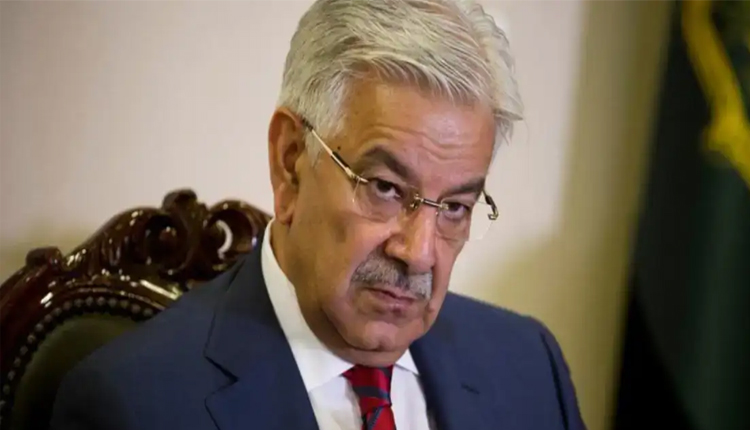Islamabad: According to Defence Minister Khwaja Asif, in a controversial speech in Pakistan’s National Assembly, said on 9 May 2025, students from madrasas could be “a second line of defence” in the event of a war with India. Shah’s comments, which come on the heels of strained relations following India’s Operation Sindoor, have drawn widespread condemnation for endorsing the use of children as combatants. Asif’s comments show the increasing fear among Pakistani leaders after India destroyed nearly all the terrorist infrastructure – directly hitting Pakistan’s military capabilities.
Asif delivering a speech at the National Assembly
Addressing the National Assembly, he said, “There are no question about madrasas and madrasah students, who are our second line of defence. Students studying there, connected to faith, are free to access urban services for their urban needs, etc. The comments have sparked controversy and allegations that the party exploits children in conflict. Asif made the statement as Pakistan deals with the consequences of Indian armed forces’ actions against them. This includes destroying terrorist bases and targeting primary air defences in Lahore.
Reflecting such divisive and fearful sentiments within Pakistan’s leadership were statements by the defence minister. Some parliamentarians urged further escalation, but one lawmaker broke down in tears during the session. In this context of discomfort, the National Assembly has addressed Pakistan’s situation, which has been under pressure since India initiated its counteroffensive.
Cost to Pakistan and Nuclear brinkmanship
In May 2025, India launched Operation Sindoor, inflicting a devastating blow on Pakistan’s terrorist infrastructure, killing over 100 terrorists and destroying nine terror camps in Pakistan and Pakistan-occupied Kashmir. Targeting 26 deaths a month after the April 22, 2025, Pahalgam terror attack, the operation also cut air defence capabilities cut to size in Lahore and Sialkot, including Chinese-made HQ-9 systems. These losses have clearly shaken Pakistani leaders, and inflammatory statements have emerged from several officials.
Asif has issued veiled nuclear threats in the past, along with others in Prime Minister Sharif’s cabinet. Asif cautioned that if Pakistan faced the threat of extinction, “there will not be anybody alive in this world,” while Railway Minister Hanif Abbasi sneeringly detailed weapons intended to support Pakistan, including Ghauri and Ghaznavi missiles and 130 atomic warheads aimed at India. These statements have raised global apprehensions over the likelihood of a nuclear escalation in the region.
Earlier, Pakistan’s ambassador to Russia, Mohammad Khalid Jamali, was reported by Russian media to have said in a televised interview that Pakistan would go nuclear against India if it ‘invades’ Pakistani territory, claiming that documents about such Indian military plans had been leaked. Such fiery statements have exacerbated diplomatic relations and re-emphasised Pakistan’s insecurity against India’s military superiority.
Pakistan’s Production System: Fear and Confusion
India’s precise and measured strikes have exposed Pakistan’s military and political establishment’s vulnerability, creating visible disarray in the country. Pakistani leaders’ panic to save their assets has even led some of them to advise their leadership to de-escalate to prevent further losses, given that they have lost critical defence infrastructure in the conflicts. Asif proposed that madrasa students could form a “second line of defence. This has been condemned by critics as a desperate measure indicative of Pakistan’s compulsions post Operation Sindoor.
Asif’s statements have raised alarm in the international community, with critics slamming the moral and legal ways children are being used in war. There are posts on X condemning this statement, calling it a “pathetic, wretched attempt to exploit religion for military purposes”! Asif had in past interviews also acknowledged Pakistan’s battered international reputation due to its backing of terrorist groups. This is a controversy that has now added to his country’s deteriorating image.
India’s strategic advantage
The key aspect of Operation Sindoor is that not only has this allowed India to shake the very foundation of Pakistan’s terrorist networks, but it has also allowed India to portray the image of armed precision and restraint. In this operation, only terrorist infrastructure related to organizations such as Jaish-e-Mohammed, Lashkar-e-Taiba, and Hizbul Mujahideen was targeted. And was careful not to target Pakistan’s military facilities. On May 8–9, since India had just about switched its air defence systems on – including the S-400 and Integrated Counter-UAS Grid – after the Balakot airstrike, when Pakistan attempted to retaliate by sending over a hundred drones and missile strikes, India successfully neutralised them, which just underscored the technological and strategic gap between both nations.
The Indian government, under Prime Minister Narendra Modi, has maintained an unyielding but non-provocative position. It argues that Operation Sindoor was a retaliation against Pakistani support for terrorism. Pakistan too made sure to milk every dime it could out of its own pyrrhic victory on social media, while also covering up the facts of a humiliating defeat, but statements from Indian leaders like Foreign Secretary Vikram Misri, Colonel Sofia Qureshi, and Wing Commander Vyomika Singh made clear India’s commitment to its sovereignty without wanting civilian casualties, compared to the reckless terrorism-promoting strategy of Pakistan.
Global and domestic reactions
Domestically and internationally, Asif’s remarks have been sharply criticised. On this front, even in Pakistan, the suggestion that ‘madrasa’ (religious school) students will be drawn into conflict has led to a national debate on the priority the government attaches to citizens above years of botched crisis handling. The statement has drawn condemnation worldwide for “violating” humanity, with a call for Pakistan to avoid the escalation of violence and threats against civilians.
In India, the public and the government behind operation Sindoor have come together since it is perceived as a justifiable response to Pakistan’s provocations. Citizens and leaders across the nation have praised the armed forces for executing the operation with precision and bravery. This has only helped bolster national pride. Nonetheless, India is on its toes, prepared with extra fortifications and civil protection drills to defend itself against any possible further Pakistani intrusion.



Comments are closed.